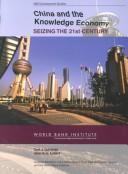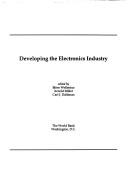| Listing 1 - 10 of 18 | << page >> |
Sort by
|
Book
ISBN: 0521228816 0521072506 0511896395 9780521228817 Year: 1980 Publisher: Cambridge: Cambridge university press,
Abstract | Keywords | Export | Availability | Bookmark
 Loading...
Loading...Choose an application
- Reference Manager
- EndNote
- RefWorks (Direct export to RefWorks)
In this book, Professor Dahlman applies modern economic methodology to an old historical problem. He demonstrates how the quaint institutions of the ancient English open field system of agriculture can be understood as an intelligent and rational adaptation to a particular problem of production and to certain historical circumstances. He argues that the two major characteristics of this type of agriculture - scattered strips owned by individual peasants and extensive areas of common land - both fulfilled vital economic functions. This overturns the traditional view of the open field system as inefficient and rigidly bound by tradition, and throws light on the behaviour of medeival peasants. Professor Dahlman also offers some generalisations about the economic theory of institutions and institutional change, refuting the idea that an economic analysis of institutions must necessarily be deterministic. As a challenge to some of the fundamental criticisms of the application of economic theory to historical problems, the book will be of great interest to agrarian historians and to economic historians generally, as well as to specialists in the medieval period.
Commons --- Inclosures --- Land tenure --- History --- -Inclosures --- -Land tenure --- -Agrarian tenure --- Feudal tenure --- Freehold --- Land ownership --- Land question --- Landownership --- Tenure of land --- Land use, Rural --- Real property --- Land, Nationalization of --- Landowners --- Serfdom --- Enclosures --- Common lands --- Communal land --- Communal lands --- Public lands --- Marks (Medieval land tenure) --- Natural resources, Communal --- Village communities --- Law and legislation --- Geografie --- History. --- Landschapskunde --- Historische geografie --- Algemeen. --- -History --- Arts and Humanities --- Commons - England - History --- Inclosures - History --- Land tenure - England - History
Book
ISBN: 9780804777131 9780804786935 Year: 2012 Publisher: Stanford Stanford university press
Abstract | Keywords | Export | Availability | Bookmark
 Loading...
Loading...Choose an application
- Reference Manager
- EndNote
- RefWorks (Direct export to RefWorks)
International economic relations --- International relations --- China --- China --- India --- India --- Economic conditions --- Foreign economic relations. --- Economic conditions --- Foreign economic relations.
Book
Year: 2000 Publisher: Washington, DC: World Bank and OECD
Abstract | Keywords | Export | Availability | Bookmark
 Loading...
Loading...Choose an application
- Reference Manager
- EndNote
- RefWorks (Direct export to RefWorks)
Information technology --- Knowledge management --- High technology --- Knowledge economy --- Economic aspects

ISBN: 0821350056 9786610087334 1280087331 0585437394 Year: 2001 Publisher: Washington, D.C. World Bank
Abstract | Keywords | Export | Availability | Bookmark
 Loading...
Loading...Choose an application
- Reference Manager
- EndNote
- RefWorks (Direct export to RefWorks)
Economic policy and planning (general) --- Internal politics --- China --- S10/0251 --- S10/0330 --- S10/0760 --- S10/0835 --- S10/0700 --- S14/0454 --- Education and state --- -Information technology --- -Knowledge management --- -Technological innovations --- -Technology and state --- -State and technology --- Technology --- Endowment of research --- Science and state --- Breakthroughs, Technological --- Innovations, Industrial --- Innovations, Technological --- Technical innovations --- Technological breakthroughs --- Technological change --- Creative ability in technology --- Inventions --- Domestication of technology --- Innovation relay centers --- Research, Industrial --- Technology transfer --- Management of knowledge assets --- Management --- Information technology --- Intellectual capital --- Organizational learning --- IT (Information technology) --- Telematics --- Information superhighway --- Knowledge management --- Education --- Education policy --- Educational policy --- State and education --- Social policy --- China: Economics, industry and commerce--General works and economic history: since 1989 --- China: Economics, industry and commerce--Employment --- China: Economics, industry and commerce--Transfer of technology --- China: Economics, industry and commerce--Postal service and telecommunications: since 1949 (including E-commerce) --- China: Economics, industry and commerce--International economic relations (incl. development aid and problems, WTO) --- China: Education--Education: since 1989 --- Economic aspects --- -Government policy --- Government policy --- Economic conditions --- -BUSINESS & ECONOMICS --- Economics / General --- Technological innovations --- Technology and state --- Knowledge economy --- Management Theory --- Business & Economics --- -S10/0251 --- -China: Economics, industry and commerce--General works and economic history: since 1989 --- -China --- BUSINESS & ECONOMICS --- -Economic policy and planning (general) --- Management. --- Cina --- Kinë --- Cathay --- Chinese National Government --- Chung-kuo kuo min cheng fu --- Republic of China (1912-1949) --- Kuo min cheng fu (China : 1912-1949) --- Chung-hua min kuo (1912-1949) --- Kina (China) --- National Government (1912-1949) --- China (Republic : 1912-1949) --- People's Republic of China --- Chinese People's Republic --- Chung-hua jen min kung ho kuo --- Central People's Government of Communist China --- Chung yang jen min cheng fu --- Chung-hua chung yang jen min kung ho kuo --- Central Government of the People's Republic of China --- Zhonghua Renmin Gongheguo --- Zhong hua ren min gong he guo --- Kitaĭskai︠a︡ Narodnai︠a︡ Respublika --- Činská lidová republika --- RRT --- Republik Rakjat Tiongkok --- KNR --- Kytaĭsʹka Narodna Respublika --- Jumhūriyat al-Ṣīn al-Shaʻbīyah --- RRC --- Kitaĭ --- Kínai Népköztársaság --- Chūka Jinmin Kyōwakoku --- Erets Sin --- Sin --- Sāthāranarat Prachāchon Čhīn --- P.R. China --- PR China --- Chung-kuo --- Zhongguo --- Zhonghuaminguo (1912-1949) --- Zhong guo --- Chine --- République Populaire de Chine --- República Popular China --- Catay --- VR China --- VRChina --- 中國 --- 中国 --- 中华人民共和国 --- Jhongguó --- Bu̇gu̇de Nayiramdaxu Dundadu Arad Ulus --- Bu̇gu̇de Nayiramdaqu Dumdadu Arad Ulus --- Bu̇gd Naĭramdakh Dundad Ard Uls --- Khi︠a︡tad --- Kitad --- Dumdadu Ulus --- Dumdad Uls --- Думдад Улс --- Kitajska --- Economy of knowledge --- Information economy --- KBE (Knowledge-based economy) --- Knowledge-based economy --- Economics
Book
ISBN: 0821374389 0821374397 Year: 2008 Publisher: Washington, DC : World Bank,
Abstract | Keywords | Export | Availability | Bookmark
 Loading...
Loading...Choose an application
- Reference Manager
- EndNote
- RefWorks (Direct export to RefWorks)
The research presented in this volume explains how well-educated workers can interact with physical capital inputs to innovate and add value to processes, products and services, ultimately creating a multiplier-effect on macroeconomic growth. It fills a significant gap in the existing literature by providing a detailed map of the relationship between microeconomic inputs such as health and education services and macroeconomic outputs such as growth. Grounded in economic theory and backed by economic analysis, Knowledge and Innovation for Competitiveness makes a compelling argument that human c
Human capital. --- Technological innovations. --- Technological innovations --- Labor supply --- Human capital --- Business & Economics --- Economic History --- Effect of technological innovations on --- Brazil --- Economic policy. --- Human assets --- Human beings --- Human resources --- Labor force --- Labor force participation --- Labor pool --- Work force --- Workforce --- Economic value --- Capital --- Labor market --- Labor mobility --- Manpower --- Manpower policy
Book
ISBN: 0821304143 Year: 1984 Publisher: Washington, D.C.
Abstract | Keywords | Export | Availability | Bookmark
 Loading...
Loading...Choose an application
- Reference Manager
- EndNote
- RefWorks (Direct export to RefWorks)
Technology transfer --- Argentina --- Brazil --- India --- Korea --- Mexico --- Economic conditions. --- Zonder onderwerpscode

ISBN: 0821325221 Year: 1993 Publisher: Washington, D.C. World Bank
Abstract | Keywords | Export | Availability | Bookmark
 Loading...
Loading...Choose an application
- Reference Manager
- EndNote
- RefWorks (Direct export to RefWorks)
Digital
Abstract | Keywords | Export | Availability | Bookmark
 Loading...
Loading...Choose an application
- Reference Manager
- EndNote
- RefWorks (Direct export to RefWorks)
Book
ISBN: 0821362070 9786610165025 1280165022 0821362089 Year: 2005 Publisher: Washington, D.C. : World Bank,
Abstract | Keywords | Export | Availability | Bookmark
 Loading...
Loading...Choose an application
- Reference Manager
- EndNote
- RefWorks (Direct export to RefWorks)
In the global knowledge economy of the twenty-first century, India's development policy challenges will require it to use knowledge more effectively to raise the productivity of agriculture, industry, and services and reduce poverty. India has made tremendous strides in its economic and social development in the past two decades. Its impressive growth in recent years-8.2 percent in 2003-can be attributed to the far-reaching reforms embarked on in 1991 and to opening the economy to global competition. In addition, India can count on a number of strengths as it strives to transform itself into a
India --- kenniseconomie --- economische politiek --- az-indi 355.2 --- economische politiek - India --- Intellectual capital. --- Intellectual capital --- Information technology --- Knowledge economy --- Business & Economics --- Economic History --- Economic aspects --- Economic policy. --- Economic conditions. --- IT (Information technology) --- Capital, Intellectual --- Technology --- Telematics --- Information superhighway --- Knowledge management --- Human capital --- Knowledge workers
Book
ISBN: 0821369210 9786611385781 1281385786 0821369229 9781281385789 9780821369227 Year: 2008 Publisher: Washington, D.C. : World Bank,
Abstract | Keywords | Export | Availability | Bookmark
 Loading...
Loading...Choose an application
- Reference Manager
- EndNote
- RefWorks (Direct export to RefWorks)
Knowledge and its application are now widely recognized to be key sources of growth in the global economy. Putting knowledge to work allows countries to improve everyday life for their people, opening up new possibilities for small and medium-size enterprises and other less-developed economic groups. This volume examines the challenges and opportunities for Mexico's knowledge-based economy, offering strategies for making major improvements in the country's capacity to generate knowledge and transform it into wealth.
Education. --- Information society. --- Information society --- Technological innovations --- Information technology --- Education --- Knowledge economy --- Business & Economics --- Economic History --- Economic aspects --- Government policy --- Mexico --- Economic conditions --- Economic policy --- IT (Information technology) --- Breakthroughs, Technological --- Innovations, Industrial --- Innovations, Technological --- Technical innovations --- Technological breakthroughs --- Technological change --- Technology --- Telematics --- Information superhighway --- Knowledge management --- Sociology --- Creative ability in technology --- Inventions --- Domestication of technology --- Innovation relay centers --- Research, Industrial --- Technology transfer
| Listing 1 - 10 of 18 | << page >> |
Sort by
|

 Search
Search Feedback
Feedback About UniCat
About UniCat  Help
Help News
News